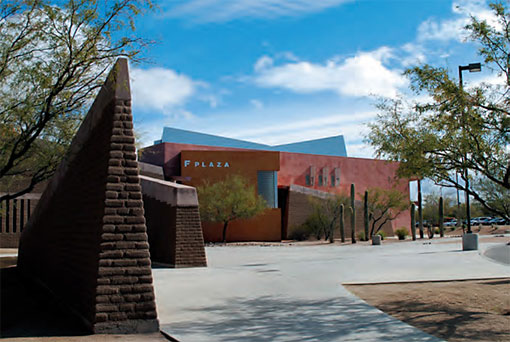| 제목 | [DAIKIN] HIGHER EDUCATION - Pima Community College | 작성일 | 16-06-16 13:41 |
| 글쓴이 | 최고관리자 | 조회수 | 6,099 |
본문
Pima Community College of Tucson, Arizona is one of the largest multi-campus community college systems in the country with 60-acres of campus.
CASE STUDY
Higher Education
Name
Pima Community College
Location
Tucson, AZ USA
Facility Size
Approximately 128,998 ft2 of classroom and facilities
Issue
35+ year old chillers and boiler system
Solution
Daikin Modular Central Plant (MCP)
with Magnitude® Chillers
Daikin Modular Central Plant delivers cost savings and more classroom space to growing Pima Community College
Given busy year-round school schedules, time is of the essence for educational institutions when considering HVAC equipment replacement projects. Such was the case at the Desert Vista campus of the growing Pima Community College system of Tucson, Arizona, one of the largest multi-campus community college systems in the country. The 60-acre campus in southwest Tucson serves 4,000 students in a number of disciplines including aviation, computers, culinary arts and early education.
After 35+ years of operation, the two chillers and the boiler system on the campus were not only inefficient; they were also starting to develop reliability problems and rising maintenance costs, an unacceptable situation in a college that operates year-round in a desert climate.
Following a long discovery process, the decision to go with Daikin’s Modular Central Plant to serve two main buildings across approximately 128,998 ft2 of classroom and facilities space became the clear choice. “The project was approved on the basis of the advantages of a packaged central plant versus a site-built central plant for installation cost savings and minimal disruption to the facility while maintaining a fast-track schedule. Daikin demonstrated extraordinary cost savings over other solutions,” says William Ward, assistant vice chancellor for facilitates at Pima Community College in Tucson, adding, “While the Pima Community College system always strives for energy efficiency, the biggest criteria for this project was timing.”
Mechanical room converted to classroom space
Another bonus of the packaged central plant configuration is its external placement, which freed up valuable classroom space at Desert Vista. The Daikin Modular Central Plant (MCP), including cooling towers are sited in an enclosed service yard just off the northwest corner of the Pueblo building, the largest of the two buildings on campus. Ward says: “The elimination of the chiller and boiler rooms in the Pueblo building allows us to expand our science lab and classroom space by about 1,850 square feet.”
The Daikin MCP was delivered to the campus in pre-engineered, pre-assembled modules. Two of the modules included two magnetic bearing 300–ton capacity Daikin model WMC chillers and two cooling towers to replace the chilled water central plant. The third module included energy-efficient sealed combustion boilers to provide both heating and domestic hot water. The unique design of the system also incorporates solar panels to supplement the heating of the domestic water at the campus. The solar panels are located on top of the domestic and heating water’s module.
Project owner William Ward first learned about Daikin’s Magnitude® WMC chiller technology a few years ago in a trade magazine and was highly interested to learn more. The magnetic-bearing frictionless centrifugal compressors of the Magnitude chillers which operate efficiently at a variety of load capacities impressed him. Ward was also impressed by the elimination of an oil handling system since it resulted in reduced maintenance and repair costs compared to traditional centrifugal compressor chillers.
Ward credits the success of the project to the skillful orchestration of the Daikin team, installing contractor, engineering and architectural services firms. Pima Community College selected architectural firm NTD in Tucson to oversee the entire project including designing the expanded classroom space and other building modifications. Michael Harris, architect with NTD Architecture says: “The approval process started in mid-summer 2009 and the main challenge was the tight timeframe under a qualification-based procurement system. The project needed to prove it wasn’t just the lowest price but the best solution. Daikin really went the extra steps to keep the project moving.”

Daikin Modular Chiller Plants combine chiller, cooling tower, pumps and interconnecting piping in pre-engineered, pre-assembled modules.
Meeting the tight timeframe
NTD Architecture chose Adams and Associates Engineers, PLLC of Tucson to design the new HVAC system. “It was a project with a tight construction schedule. The main issue was to complete the changeover within a very tight timeframe over a holiday break. If we had tried to install a site-built central plant, it would have meant much more downtime for the college,” says Stan Adams, principal with Adams and Associates Engineers.
According to Larry Borges, sales engineer from Climatec, the Daikin representative in Tucson, the project moved quickly from its award in early fall of 2009. “The project had a critical schedule. The entire demolition, installation and start up of the new system had to occur over the holiday break in time for classes to start the third week of January,” he says. “And we made that schedule”.
“Changing out an old central plant to a modular system is the way to go because you have significant site time labor savings which is critical to a project owner,” adds Jim Brown, president and CEO of Tucson-based Mechanical Systems, Inc. the installing contractor. “The project brought a tremendous amount of labor, material and time savings to Pima Community College because thousands of hours of on-site work were eliminated. The Daikin Modular Central Plant contains all the interconnecting piping work between the pumps, chillers and towers. It’s all done within the modules.”
Work by Mechanical Systems included all the demolition, fabrication of piping in the interior buildings, connection to the MCP unit and commissioning of the new system. Demolition of the old equipment began immediately following the close of the fall semester on December 21, 2009 and occurred in a phased manner which allowed for the campus to still maintain heat until the MCP was installed in January. “We extended the existing building piping to the new Daikin central plant outside the main building and the old piping came out in the boiler and chiller rooms,” Brown says.
“This project was a combined effort of our manufacturing team to pre-engineer the MCP, carry out site works with our contractors simultaneously to provide continuous operation of the existing old system, while implementing the site installation of our MCP. Everything went like clockwork,” according to Terry Young, general manager of Solutions for Daikin Applied.
By the time the new semester commenced on January 19, 2010, the heating system was operational and the entire system was operational by early February. The Daikin MCP is integrated with an Alerton® building automation system using BACnet® communications. For the most part the MCP is run remotely from Pima Community College’s centralized campus control system in Tucson. The Daikin chillers inside the MCP have unit controllers with the Open Choices® feature offering a choice of LONWORKS®, Modbus® or BACnet communications
Energy savings multiply
The upgrade to high efficiency chiller technology at Desert Vista Pima Community College qualifies for an incentive program from Tucson Electric Power, which will reduce the college investment in the new equipment, in addition to the operating cost savings. All told, energy savings from the new Daikin plant versus a traditional central plant are significant. For starters, the new MCP reaps a significant reduction in electrical power costs over the college’s traditional central plant. Natural gas costs are also reduced from the energy-efficient boilers inside the MCP, aided by the use of the solar panels for domestic hot water. “The Daikin MCP runs great at low loads or high loads. I’m expecting our overall energy costs associated with heating and cooling will be greatly reduced, up to 40 percent or more,” Ward says.

The Modular Central Plant includes two energy efficient, magnetic bearing compressor chillers that provide a big portion of the estimated 40% in mechanical utility cost savings.
Another change with the Daikin MCP that contributes to significant energy savings involved changing the existing chilled water system from a constant flow to a primary variable flow system. The existing air handler’s chilled water control valves were all changed from 3-way to 2-way. “Changing the central plant from constant to primary variable flow increases the temperature rise through the system making the chillers far more efficient and at times can reduce pump horsepower by up to 80 percent,” Adams says.

Pima Community College in Tucson, Arizona, estimates that it will save 40% in over-all energy costs for heating and cooling after replacing two 35-year-old chillers and a boiler with a Daikin Modular Central Plant.
Ward says the Daikin chiller technology and hot-water heating contained in one MCP is a win-win for the Pima Community College system and the college will definitely consider the technology for future replacement projects. “It has been a great partnership with Daikin. From the design group to the sales group and the contractor and the product itself, it was all phenomenal.”

High efficiency sealed combustion natural gas boilers in the Daikin Modular Central Plant provide space heating to the Pueblo building on the Desert Vista campus.

The Modular Central Plant at Pima Community College includes solar panels used to heat domestic water, further increasing energy costs savings.
| 이전글 | [DAIKIN] HIGHER EDUCATION - Florida Community College 2016-06-16 | ||
| 다음글 | [DAIKIN] HIGHER EDUCATION - St Olaf Science Bldg 2016-06-16 | ||






